I’ve never waffled so much about a trip as I did with cycling Cambodia from Siem Reap to Sihanoukville. This type of indecisiveness was a stark contrast to other adventures where I’m often the first one out the gate.
Source of my hesitation
It wasn’t the cycling, and it wasn’t Cambodia. It was the merging of the two that pushed me out of my comfort zone. Certainly, malaria and dengue fever played a part, but taking precautions could cover those stumbling blocks. No, the major concern was heat exhaustion, and not being able to keep up in the gruelling energy-sapping heat. I became fixated on one cycling day in particular of 90 kilometres. Like an unrelenting itch, it was at the heart of my hesitation.
The tour involved 300 kilometres of cycling. I was joining two friends, and their six friends from Australia. All are avid leisure cyclists who bike year round in tropical North Queensland. Their playground is about the same distance south of the equator as Cambodia is to the north. I was coming from Canada, where cycling is seasonal in summer temperatures mirroring a cold North Queensland winter day. And, tropical diseases are not something to be concerned about.
Taking the plunge
A few back-and-forth emails convinced me to take the plunge. My friends would pack tropical-strength insect repellent and sunscreen and coach me on strategies to remain hydrated. Their experience cycling in tropical conditions was a source of comfort, and the availability of a support van sealed the deal. I loaded up on a course of anti-malarial pills and purchased a few pieces of protective clothing. As an additional strategy, I booked my flight to arrive a week earlier to get acclimatized.
Getting acclimatized
Exiting the terminal in Phnom Penh, I was greeted with a blast of hot evening air. My first thoughts were “Thank goodness I came a week early. There’s no way I could jump on a bike in this.” I figured with careful planning over the days ahead, I could possibly develop some tolerance to the heat.
My first stop was Me Mates Villa, a base for a few pleasant days exploring Phnom Penh. As is the case with hostels, I enjoyed interacting with many other travellers when tips and tales were shared on past and future travels. From Phnom Penh, popular next stops were the magnificent temples near Siem Reap, the beaches of the Gulf of Thailand, or other countries in Southeast Asia.
My mention of a 300-kilometre cycling trip was invariably met with “WHAAAT??” or “Anne, you’re my hero!!” Comments such as these from travellers half my age weren’t at all convincing I’d made the right decision. The doubts still lingered. What did they know that I didn’t? And that 90-kilometre day had taken on a life of its own, assuming more space in my mind than it deserved.
I found my way to Siem Reap and awaited the arrival of my travelling companions. We were all of a similar vintage, and it was clear from the get-go I was in great company for cycling in Cambodia.
Cycling Cambodia
The same rang true with everyone from Cambodia Cycling. From beginning to end, everything was expertly coordinated. The four staff accompanying our nine-person group did everything within their power to assure our safety, security, and comfort at all times. They were amazing. Absolutely amazing.
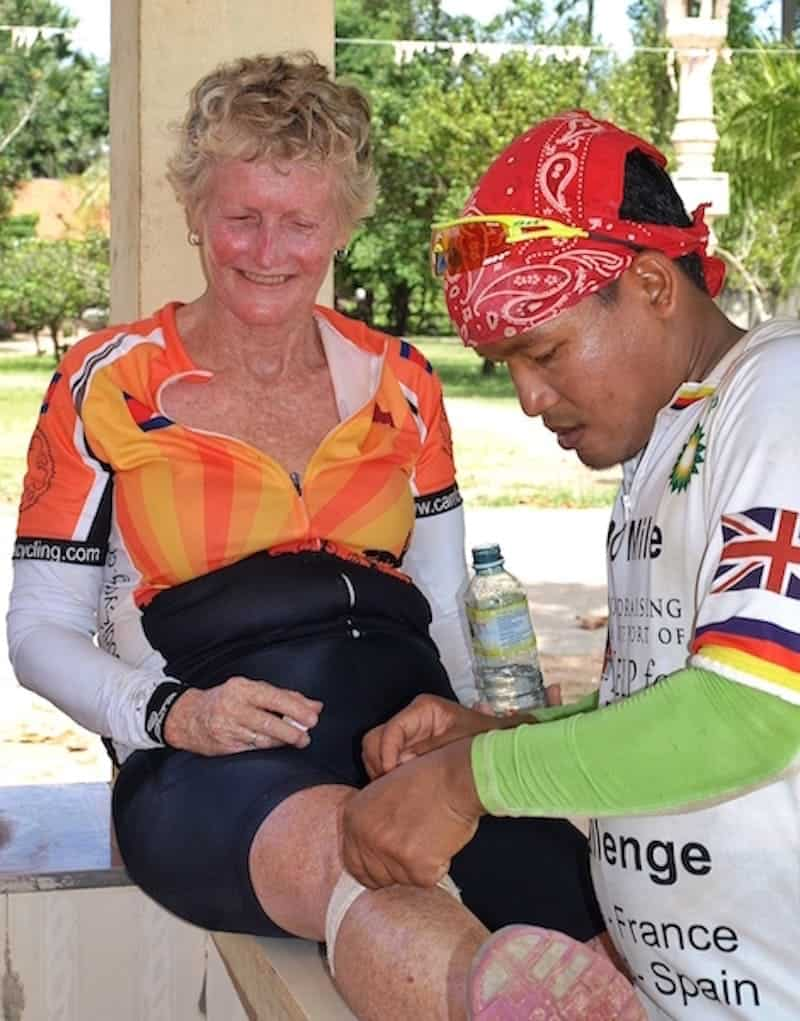
I loved the diversity built into the tour. There was a mixture of cycling and non-cycling days, and both were interspersed with hiking, swimming, and guided tours. Most of us had never been on mountain bikes (brand new Giant ones at that), and became converts as a result. Evading tree roots, fording streams, and dodging animals introduced variety into the ride.
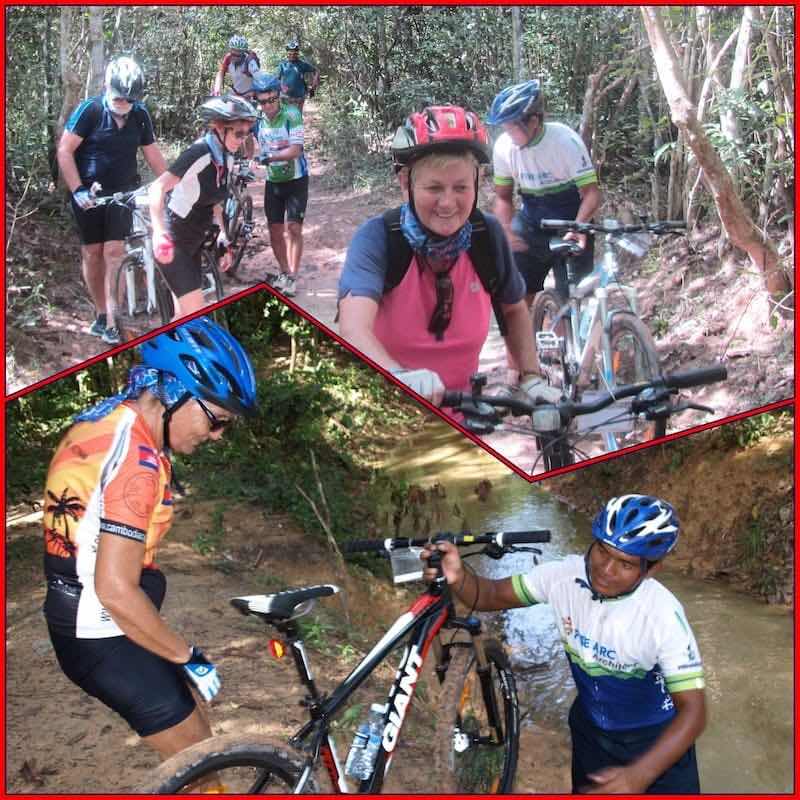
Spending two days exploring the remarkable Angkor Archeological Park by bike was a highlight.
Unlike other forms of transportation, a bike can be more conducive to interacting with locals. We passed through villages and encountered friendly, hard-working Cambodians going about their daily lives.
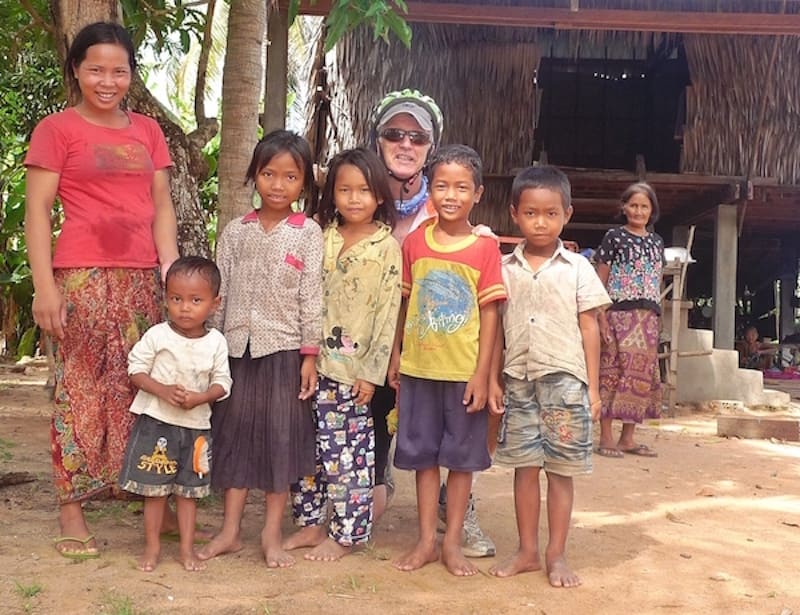
We met children on their way to and from school. They loved to exchange versions of a high-five, or constantly shout “Hello” as we passed.
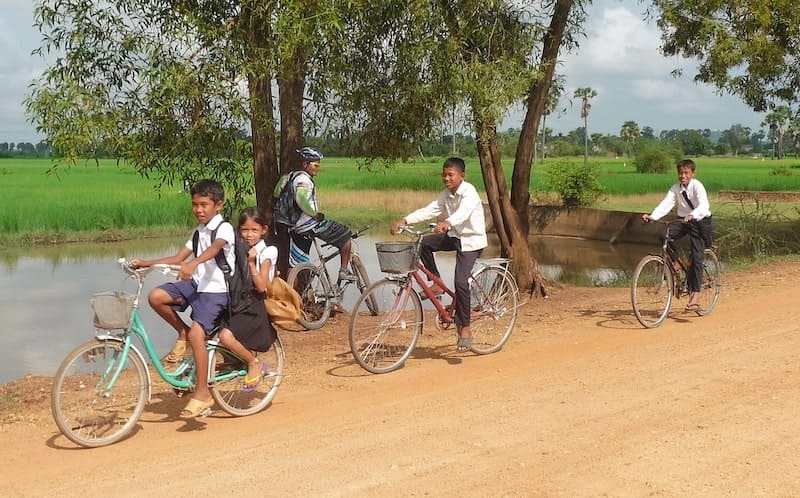
On breaks in village squares and schoolyards, we were objects of curiosity.
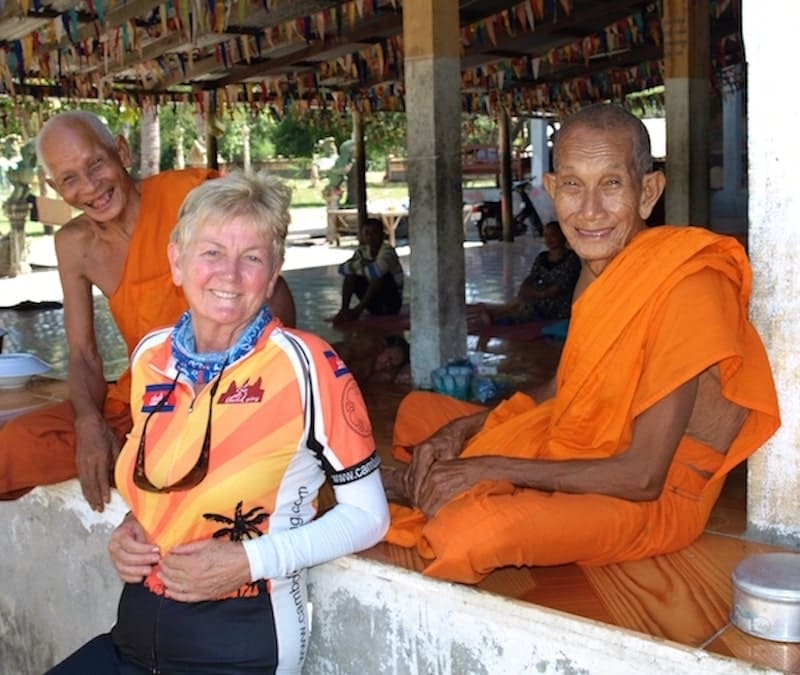
We travelled by boat from Siem Reap past the floating village of Chong Kneas. Water levels were high in early November, and we made good time along the Tonlé Sap river system to where it merges with the mighty Mekong River at Phnom Penh. The boat was equipped with bus-like seats. Many passengers, especially tourists and foreigners, headed outside for the deck around the wheelhouse, or to climb up to the roof. With plenty of sunscreen, it was possible to spend part of the six-hour journey outdoors.
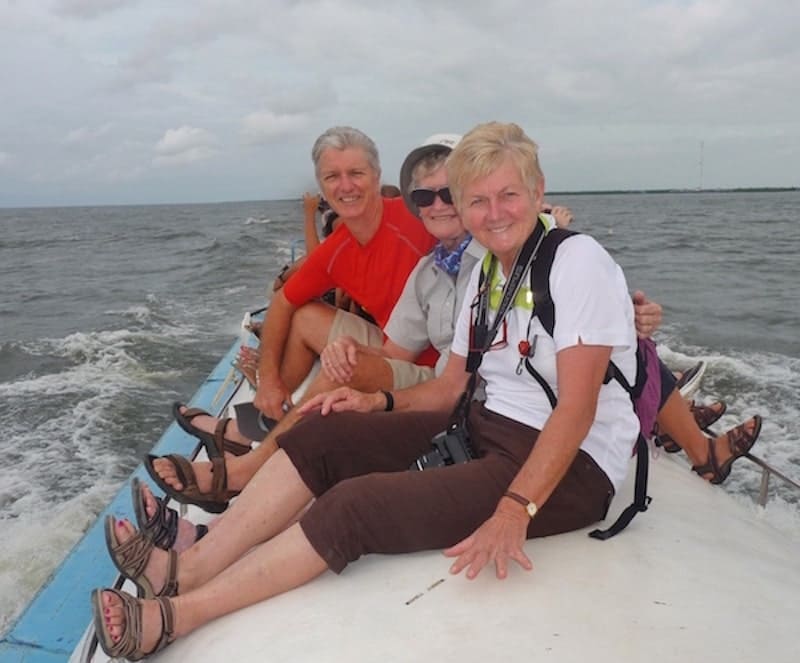
After reaching the coast of the Gulf of Thailand, we spent a free day in Sihanoukville. A boat tour took us to three islands where we enjoyed snorkelling and swimming.
We couldn’t get enough of Cambodia’s inexpensive yet delicious Khmer cuisine. We found several unique restaurants in Siem Reap to explore the rich culinary landscape. In Phnom Penh, I stumbled across Friends, a training restaurant that helps marginalized youth prepare for employment in tourism or food services. The spiced fish fillet wrapped in banana leaf was divine.
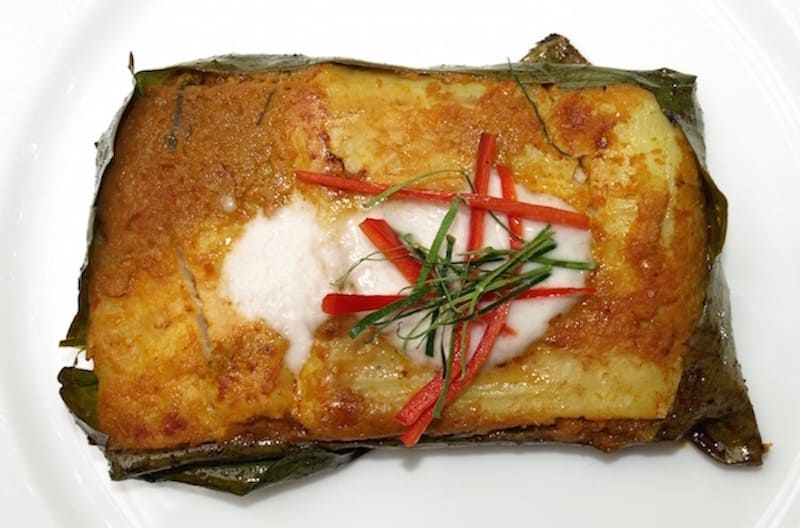
The verdict
As it turned out, my fears were not totally unfounded, but certainly not insurmountable. Mosquito-borne diseases are not something to be taken lightly, but I could have skipped the Malarone. I saw two mosquitoes the entire time, and protective clothing and repellent would have been sufficient. Remaining hydrated was a daily constant as we consumed oodles of bottled water, soft drinks, and chilled coconut water. Cooling down at rest stops was achieved by dipping our Buffs in the water of the icebox.
At a time when more travellers are looking for experiences from the vantage point that two wheels provide, I can heartily recommend cycling in Cambodia.
Oh, and that 90-kilometre day? It was like every other. Exhilarating.
Logistics
Cambodia’s official currency is the Cambodian Riel (KHR), with the U.S. dollar (USD) the country’s unofficial second currency. Most tourist-oriented businesses quote prices in dollars, as do most grocery stores and restaurants. Even the $35 visa on arrival must be paid in USD. I didn’t see any coins, in either KHR or USD. If something costs less than a dollar, change is given in KHR with a street value of 4,000 to the dollar. Carrying USD in larger denominations may result in receiving a fistful of KHR, as I found out after buying my first street food with a $20 bill. Pack USD in smaller denominations.
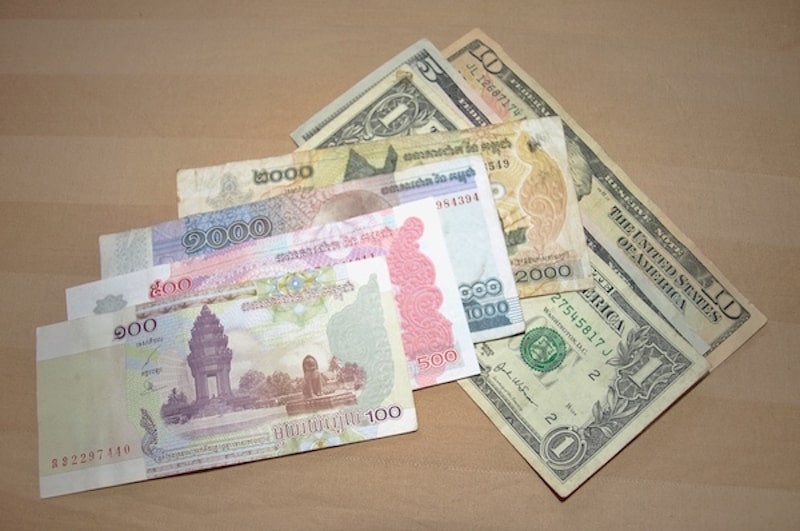
If you enjoy staying in hostels, Me Mates Villa is conveniently located in the heart of Phnom Penh. It features a restaurant and bar with indoor and outdoor seating – an ideal environment for striking up conversations with other travellers. I found the best price at Agoda: $30 total for 4 nights in a 6-bed women’s dorm.
With promises of glimpses of the Cambodian countryside, I elected to travel overland by bus (a six-hour trip) from Phnom Penh to Siem Reap. The $13 fare on Mekong Express included shuttle service from the hostel. When water levels permit, another option is to take the ferry ($35). Some sections are very interesting, especially when lathered in sunscreen sitting on the top of the boat. For more information and options, see How to get from Phnom Penh to Siem Reap (and vice versa).
In Siem Reap, I stayed at the centrally located Golden Temple Villa. The rate of $20 per night included pick-up service by tuk tuk, a welcome iced lemon tea and snack, bottled water in the in-room fridge, iced tea and fruit in the restaurant, and a one-hour Khmer massage during my stay.
The 8-day/7-night Angkor to Sihanoukville cycling tour cost $887. This included the tour cost of $721, a single supplement of $96, and $70 for the bike rental. It covered accommodation in 4-star and 3-star hotels, in-tour transfers by van and boat, entrance fees, a two-day temple pass, two support vans with two drivers, two guides, refreshment breaks, and most meals.
Malaria and dengue fever are serious diseases carried by mosquitoes. We used tropical-strength Bushman Insect Repellent and Hamilton Sensitive SPF 50+ Lotion. Castelli Chill Arm Sleeves and a UV Protection Buff provided additional protection from mosquito bites and the sun. To guard against dehydration, Nuun Active Hydrating Electrolyte Tablets complemented our fluid intake.
In fact, my Buff turned out to be the most useful item I’d packed. For more information on this versatile piece of kit, see A multipurpose essential: Buff for the packing light traveller.
Might you be interested in my other posts on Cambodia?
If you found this post helpful, please share it by choosing one or more social media buttons. Now it’s over to you. Do you have any recommendations for visiting Cambodia? Please add your thoughts in the comments. Thank you.
Care to pin it for later?
Some of the links on this page are affiliate links. If you use them to buy something, you don’t pay more, but this website earns a small commission which helps pay the cost of running the site. Thank you for your support.
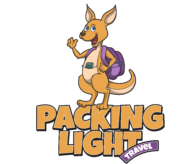
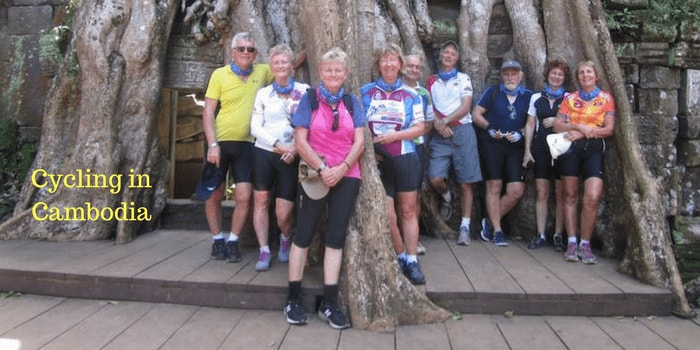
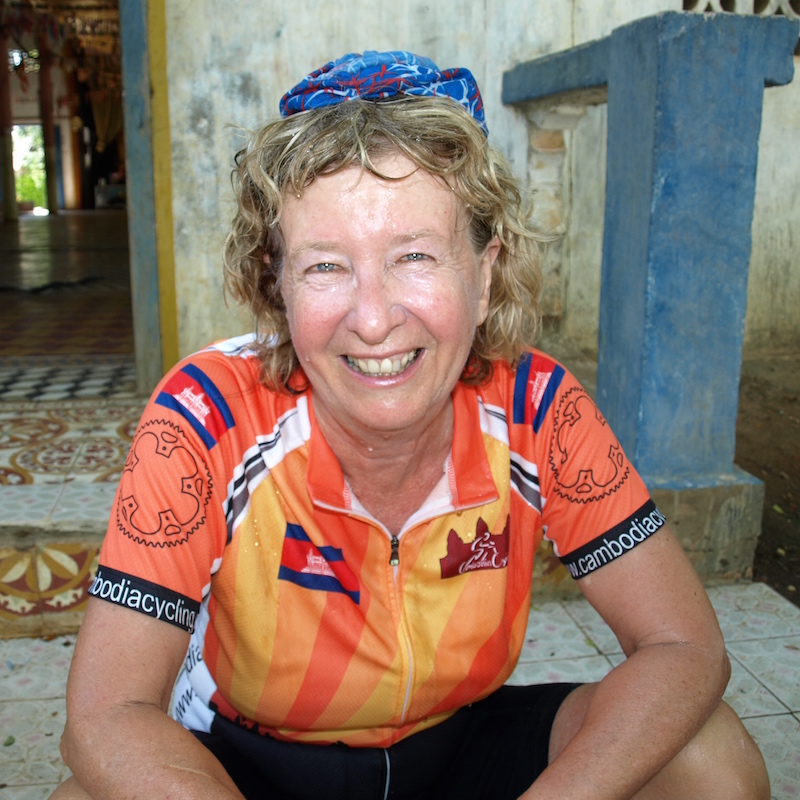
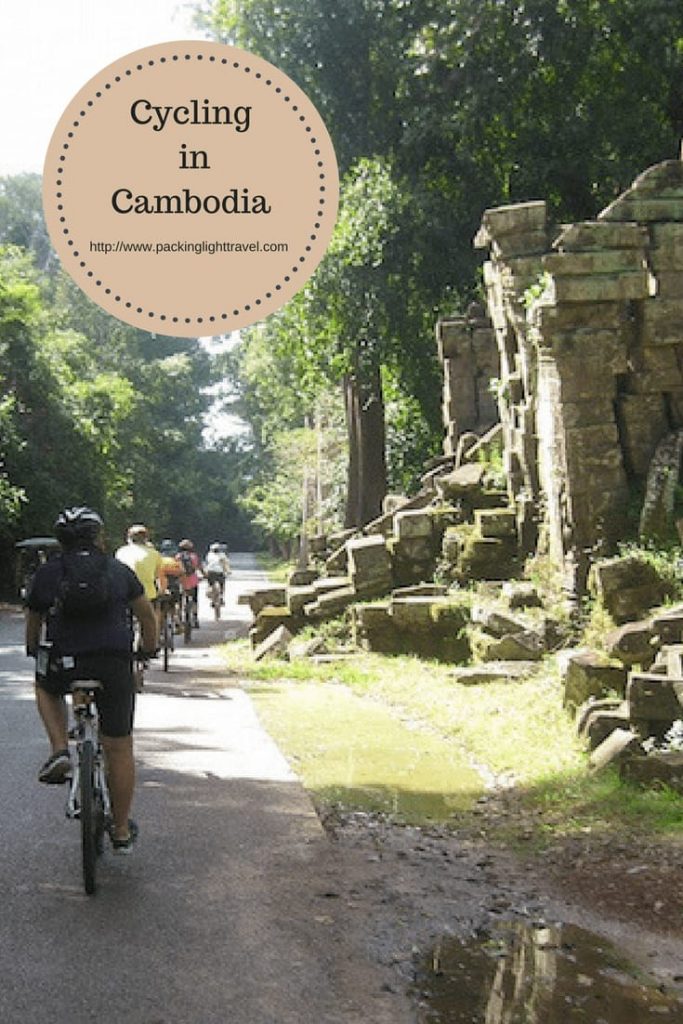
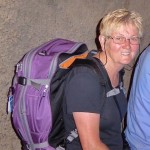
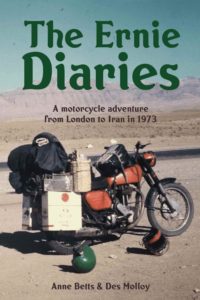
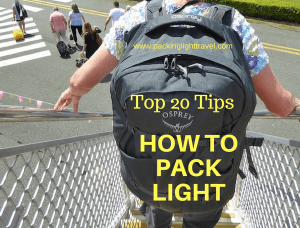

Cambodia is an excellent place for cycling. There are many cycling trails in Cambodia.
It’s a great post for a beginner of the mountain biker. I am pretty much to your excellent writing for a mountain biker. It will help us increase our cycling skill.
I really enjoyed this article, Anne. Entertaining and education don’t often blend well, but you are certainly engaging enough to pull it off. Nice work!
I really like the “logistics” section and you have a remarkable ability to make this place feel familiar. The price strike me as very reasonable.
What was the ride like? Are we talking Tour de France topography or a relatively flat run on paved roads? I’m just curious.
Thanks Mark. All roads and trails were relatively flat. I recall a challenging hill on the last day that a couple of folks managed to ride. The tour company did a great job in choosing a route suitable for a variety of ages and fitness levels.
This sounds like fun. I will add cycling into my itinerary the next time I visit Cambodia.
Good evening Anne! Mark said it well, entertainment and education is not easy to mix. From reading the article I can feel that you have an abundance of first hand experience. What really struck me the most is the tour company. WoW! I mean they thought about everything. Some really high quality service, this level of service is pretty rare.
oh, I didn’t know there were these kind of ciclying opportunities in Cambodia! We’ve just returned form South East Asia, we had so much fun, it is an incredible part of our planet. THanks for sharing, saved it for our next time there, it must be an amazing experience!